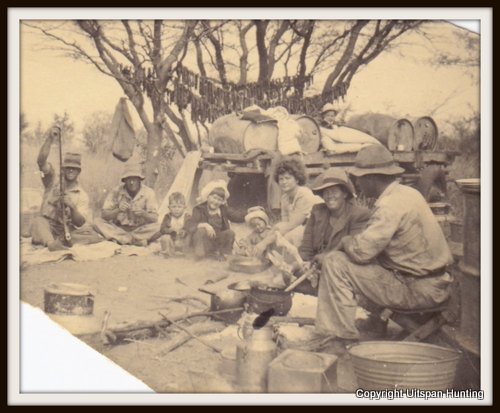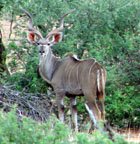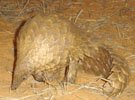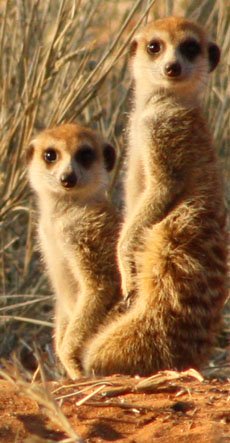For more information about our hunting safaris, don’t hesitate to reach out and contact us!
Kalahari Chronicles: A Woman Hunter’s Tale of Tranquility and Thrill
by Maria
(Swakopmund, Namibia)

Maria with her Springbok and dad Michael
It’s been quite a few years since I walked with my dad on a hunt on foot, and the last time I did it was with my mom and two siblings in tow, so you know, like every child with siblings will tell you, it didn’t really count 😉. As the daughter of a Professional Hunter (PH), I often found myself on the periphery during the times when Uitspan Hunting was the destination for trophy hunts. I would watch other hunters as they pursued trophies destined to grace homes across the oceans, each one a lasting memento of their African hunting experience in Namibia, capturing the joy it brought them.
I was fortunate to shoot my first animal at a young age and even took down a giraffe a few years ago, an experience I consider one of the highlights of my life. However, hunting on foot is an entirely different endeavor compared to shooting from a vehicle, which was typically how I hunted when given the opportunity. This is why I feel compelled to share my perspective on this experience, striving to present it as objectively as possible, so I can truly convey what it was like.
I took my annual leave from a rather demanding corporate job this August and returned to my birthplace, as I do once or twice a year. The 9-hour drive from our home at the coast feels brief and delightful, knowing that it ends with the warm smiles of my family and my brother’s children, surrounded by nature so pristine that it’s as if God’s presence is more tangible there than anywhere else in the world. Uitspan Ranch offers the rare luxury of limited cell signal, which meant I was blissfully free from the constant barrage of emails and phone calls. My excitement for this trip is impossible to contain every time, and I always feel that the precious time I spend there is too short.
During this week, we enjoyed our usual fellowship, with my mother preparing meals that I’ll dream about for weeks afterward. She bakes sourdough bread, my father grills the most exquisite meats, and we dine like royalty. A few days before my friend and I were set to return home, my dad asked if we’d like to go on a hunt. My friend, who had never experienced shooting an animal before, was understandably nervous and unsure of what awaited her. Having not hunted on foot with my dad for many years, I also felt the fitting nerves of a first-timer.
On the day of the hunt, we began with a comprehensive briefing on gun safety, followed by target practice at 100 meters. My dad explained the basics of gun handling in a way that was genuinely engaging, and never once sounding condescending—a refreshing departure from the typical "mansplaining" that often occurs when women are advised in traditionally male-dominated activities.
We then learned how to shoot from shooting sticks, with my dad standing right behind us, guiding us as we aimed at the target. He calmly instructed us on how to hold the gun steady while it rested on the sticks, and how to balance our weight on the ground to ensure a firm stance. My dad’s gun, a .308 equipped with a silencer, made shooting a breeze with its minimal recoil. It’s a dream for any woman to shoot with, as it spares you from the harsh kickback that can make the experience unpleasant. This is especially important to note for any woman who may have had a negative experience with gun recoil before, perhaps making her skeptical about handling firearms in the future. But fear not—my dad will show you the ropes and make you feel right at home on the hunting grounds!
After a few rare compliments from the PH—compliments that held weight, as my father only offered them when he truly meant it—we felt a surge of confidence and set off on our hunting journey. My friend went first, and my dad drove us to an area he identified as the territory of an Impala, isolated from the herd after losing battles with other males. My dad quickly spotted the Impala, pointed it out, and we casually drove past it, parking the vehicle at a distance so we could continue on foot.
As we disembarked, my dad whispered that we should remain silent and follow him closely, so the Impala would perceive us as a single figure. He led the way, binoculars in hand, while carrying the shooting sticks my friend would use. She followed close behind, carrying the .308 so that she would be ready at any moment, and I took up the rear, tasked with capturing the hunt on video. We began our silent trek through the red sand and thick bushes, stalking an animal so clever that even my dad, a seasoned PH with over 30 years of experience, had to employ every trick in his arsenal to avoid alerting the Impala to our presence. From the outset, I was filled with adrenaline and excitement. As an observer on this hunt, I had moments to appreciate the quiet beauty of the Kalahari landscape, which vibrated with color and life.
We walked in silence for long stretches, striving to be as quiet as possible. It was ironic how indifferent nature seemed to our need for silence—a woodpecker made its presence known at a critical moment when we stood so still I could hear my own heartbeat. The Impala remained unfazed by the woodpecker but was wary of the unfamiliar “figure” in its environment, even with our camouflaged clothing. It circled us cautiously, making it challenging to keep track of its movements. After about an hour and a half of stalking, with only a single pause, the Impala finally presented a clear shot. My dad placed the .308 on the sticks, ensured it was ready, and my friend lowered her head to peer through the scope. We were both slightly breathless, a mix of excitement and our own lack of proper fitness. My dad calmly whispered where she should aim, saying, “Breathe slowly and relax, then shoot whenever you’re ready.” Despite the fleeting opportunity, there was no urgency in his voice. My friend took her time and fired a perfectly placed shot that brought the Impala down. She was giddy from joy, and with bright eyes and an ear-to-ear smile, her hunt was concluded.
After taking pictures, we returned home for a hearty lunch followed by the customary siesta. Later in the afternoon, we set out again, driving along the border with Botswana, scanning the terrain for tracks and signs of predators that might have wandered onto our land uninvited. We stopped the vehicle when we spotted a Gemsbok and several Springbok grazing in the distance. Once more, we disembarked to continue the pursuit on foot, this time with me carrying the .308, ready to seize any opportunity that arose. We stood to look at the Gemsbok for a while, a loner that seemed to not be bothered by us at all. Throughout our journey, my dad would quietly share fascinating insights about the animals and the environment whenever the moment allowed.
The Kalahari, with its vast stretches of red dunes and golden grasses, enveloped us in a stillness that felt almost sacred. My dad, towering at 6 ft 6, moved with quiet confidence, often pausing to peer through his binoculars. From my shorter vantage point, I could only guess at what he saw, but I trusted his intimate knowledge of the Kalahari’s wildlife, honed over decades. We followed him through the landscape, savoring the crisp, dry air that carried the subtle scent of grass and brush. The silence was profound, broken only by the soft crunch of sand beneath our boots and the occasional rustle of the wind through the thorny bushes.
Eventually, my dad pointed out a Springbok partially obscured by the dense brush. From where I stood, it was barely visible, a fleeting shadow in the tall grass. He quickly set up the shooting sticks, and I planted my feet firmly apart, steadying myself just as he had taught us. Time seemed to stretch as I focused on controlling my breath, each second feeling like an eternity. Finally, I took the shot, and the Springbok dropped instantly. The rush of adrenaline was exhilarating, and I couldn’t help but remark that I now understood why people become so passionate about hunting. The thrill is real, and it’s easy to see how the fever of the hunt can take hold. The Springbok treated us to a memorable pronk that showcased the pure magnificence of God’s creation in the Kalahari. And, as with all good things, my hunt too reached its end.
If you, like me, navigate the complexities of a corporate world, where the demands of people and the drama of work often weigh heavily on your spirit, I can’t recommend a visit to the Kalahari in Namibia highly enough—specifically, to Uitspan Hunting Ranch. I don’t make this recommendation lightly, aware of how it might sound coming from someone who grew up there. But I also know how essential it is for our souls to find stillness, to retreat from the relentless pace of our industrialized lives.
The Kalahari offers a rare and precious remedy for this modern malaise. Its remoteness strips away the noise of the world—here, there is no cell signal, only the profound silence of nature that compels you to reconnect with what truly matters. At Uitspan, the distractions of daily life dissolve, leaving space for the things that nourish us: the savor of home-cooked meals, the camaraderie of good company, the gentle guidance of seasoned hunters, and the breathtaking beauty of a landscape untouched by time. Female hunters will also find comfort in my dad’s 30-plus years of professional hunting experience, as he creates a welcoming and supportive environment that makes even first-timers feel at ease.
This place is a sanctuary, not just for hunters, but for anyone with a deep appreciation for the quietude that allows the heart to breathe. It’s a place where nature’s rhythms become your own, and where true connection—with the earth, with others, and with yourself—feels as natural as the wind through the camelthorn trees. For those who seek tranquility, who long to escape and simply be, Uitspan Hunting Ranch is more than a destination—it’s a return to the simple, profound joys of life.
Meaning of "Uitspan"
'Uitspan' is an Afrikaans word that means place of rest.
When the Boer settlers moved inland in Southern Africa in the 1800's, they used ox carts. When they found a spot with game, water and green grass, they arranged their ox carts into a circular laager for protection against wild animals and stopped for a rest.
They referred to such an action of relaxation for man and beast, as Uitspan.

(Picture above of our ancestors.)
Did you know? Greater Southern Kudus are famous for their ability to jump high fences. A 2 m (6.56 ft) fence is easily jumped while a 3 m (9.84 ft) high fence is jumped spontaneously. These strong jumpers are known to jump up to 3.5 m (11.48 ft) under stress. |
Did you know? Some animals have one sense more than man!The flehmen response is a particular type of curling of the upper lip in ungulates, felids and many other mammals. This action facilitates the transfer of pheromones and other scents into the vomeronasal organ, also called the Jacobson's Organ. Some animals have one sense more than man!The flehmen response is a particular type of curling of the upper lip in ungulates, felids and many other mammals. This action facilitates the transfer of pheromones and other scents into the vomeronasal organ, also called the Jacobson's Organ.This behavior allows animals to detect scents (for example from urine) of other members of their species or clues to the presence of prey. Flehming allows the animals to determine several factors, including the presence or absence of estrus, the physiological state of the animal, and how long ago the animal passed by. This particular response is recognizable in males when smelling the urine of a females in heat. |










